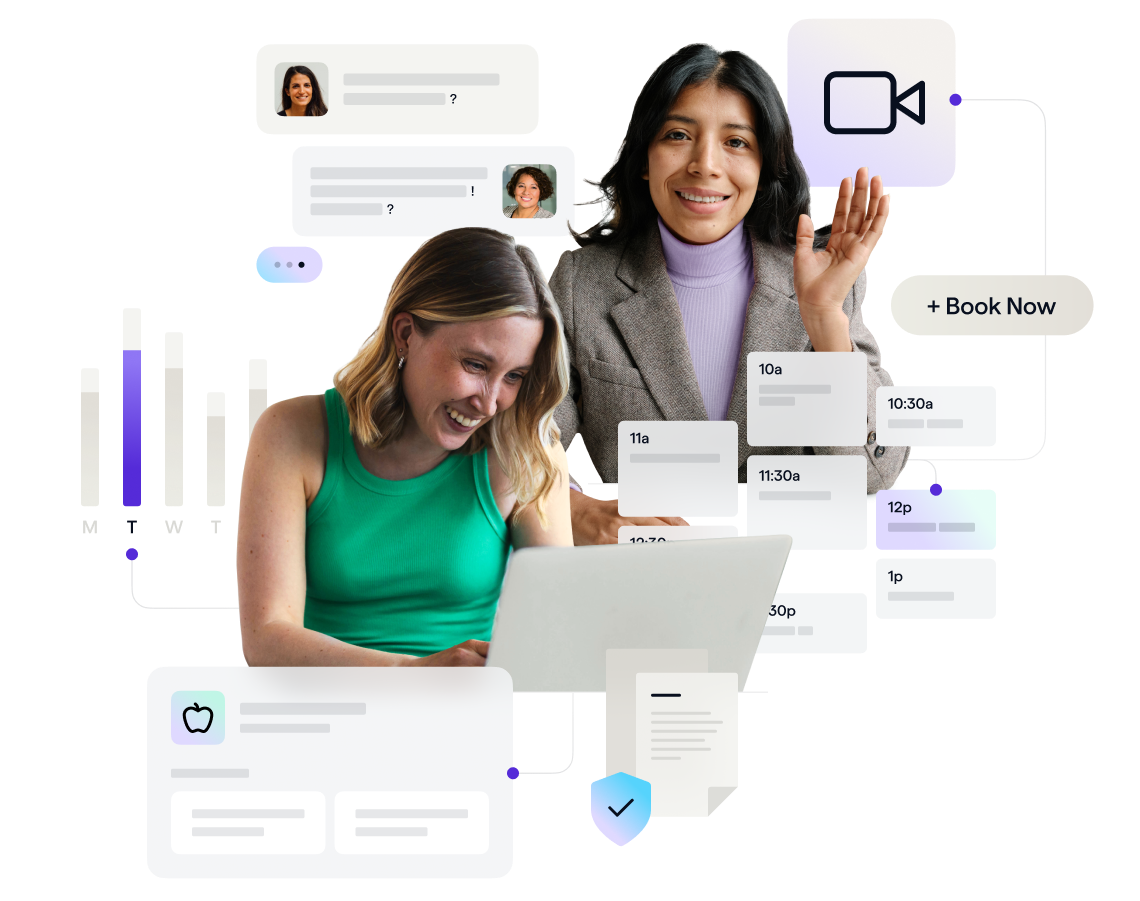

Best EHR features for nutritionist softwares
Discover the EHR features that are best for nutritionist software. Learn about mobile apps, customizable forms and more with our checklist.
As a dietitian in private practice, you can benefit from more than basic charting tools. There are now nutrition-focused Electronic Health Record (EHR) platforms that simplify client management, support your business operations, and improve the client experience. Unlike general EHR systems built for medical doctors, a specialized EHR for dietitians includes features designed for the unique needs of nutrition care. With so many options out there, how do you find the right fit?
This guide will walk you through:
- The must-have EHR features for nutritionists
- How an EHR can improve client care and business operations
- Key billing, engagement, and integration tools to look for
Why nutritionists need an EHR
Gone are the days of paper charts, endless spreadsheets, and multiple software platforms. A well-designed EHR helps you:
- Stay organized with digital charting, client records, and billing– all in one place
- Improve efficiency by automating paperwork and appointment scheduling
- Enhance client care with customized forms, progress tracking, and engagement tools
- Scale your business with telehealth, programs, and group practice support
Now, let’s dive into the essential EHR features that can take your nutrition practice to the next level.
Key features to look for in a nutritionist EHR
When creating your list of must-haves and nice-to-haves for your future platform, here are some of the most sought-after features for nutritionists and dietitians often prioritize.
1. Technical requirements
Before you explore EHR features, make sure the system meets the technical needs of your practice. Look for:
✔️ HIPAA & PCI Compliance – Ensures secure data storage & financial transactions.
✔️ Cloud-Based Access – Work from anywhere, no software installation needed.
✔️ Mobile App – Manage your practice on the go.
✔️ Multi-Provider Support – Essential for growing group practices.
✔️ Data Transfer Support – Easily migrate existing client data.
2. Customizable charting & paperwork
A nutrition-focused EHR should allow you to tailor charting forms to fit your workflow. Look for:
✔️ Charting templates – Some EHRs have customizable templates for SOAP notes, ADIME, and beyond.
✔️ Automated e-paperwork – Design automated intake and onboarding workflows to remove the upfront paperwork for new clients.
✔️ Vitals & metrics tracking – Some EHRs enable tracking of metrics directly in the client profile, such as weight, bloodwork, nutrient intake.
✔️ Client care plans & templates – Distribute meal plans and supplement protocols to clients through your EHR platform.
✔️ E-signatures – Streamline otherwise time-consuming activities for easy document completion.
If you have high client volume or want to save time on documentation, features like charting autofill and pre-built templates are game-changers.
3. Billing & payment processing
Whether you accept insurance or self-pay clients, your EHR should streamline financial workflows. Look for:
✔️ Insurance claim support – Ensure your EHR supports CMS 1500 claims and superbills for easy insurance billing and tracking.✔️ Client invoicing & payment tracking – Automatically generate invoices and track payments to stay on top of your finances.
✔️ Financial reporting – Gain insights into your practice’s financial health with comprehensive reporting to monitor revenue and expenses.
✔️ Built-in payment processing – Offer secure, seamless payment processing within the platform to reduce friction and improve client convenience
✔️ Package & subscription options – Create bundled service packages or recurring payment plans for clients to simplify billing and improve cash flow
4. Client engagement & telehealth
Building strong client relationships is key to long-term success. Your EHR should include:
✔️ Telehealth capabilities – Ensure your platform offers secure video calls and the option for group sessions to connect with clients virtually.
✔️ Client portal – Provide a centralized hub for clients to manage their appointments, access important documents, and send secure messages.
✔️ Progress tracking – Track client progress with features like food journaling, goal setting, and automated reminders to keep clients engaged and motivated.
✔️ Educational resources – Share custom courses, nutrition programs, and resources directly through your platform to support ongoing client education and empowerment.
💡 Pro Tip: EHRs like Healthie with built-in client messaging help boost retention and keep clients engaged between sessions.
{{free-trial-signup}}
5. Time-saving integrations
Your EHR should work with the tools you already use to create a seamless workflow:
✔️ Calendar syncing – Sync with Google, iCal, or Outlook to keep your schedule organized and up-to-date.
✔️ Zoom integration – Easily schedule and launch virtual consultations directly from your EHR platform.
✔️ Clearinghouse connections – Seamlessly submit and track insurance claims through integrations with clearinghouses.
✔️ E-prescribing & supplement recommendations – Integrate with platforms like Fullscript and Wellevate for streamlined supplement prescribing and recommendations.
✔️ Wearable device tracking – Sync data from fitness trackers like Fitbit or Apple Health to monitor client progress and personalize care.
6. Dedicated customer support
When choosing an EHR, responsive customer support is a must. Look for platforms that offer:
✔️ Live training sessions – Access training sessions to help you quickly get up and running with the system.
✔️ Quick access to support – Reach out to a support team easily via chat, email, or phone for prompt assistance.
✔️ Ongoing educational resources – Take advantage of continued learning materials designed specifically for nutrition professionals to enhance your practice management skills.
Finding the best EHR for your nutrition practice
The right EHR software should feel like an extension of your practice, helping you provide better care, stay organized, and scale your business.
💡 Looking for an EHR that checks all the boxes?
Healthie is an all-in-one practice management platform built specifically for nutrition, health, and wellness professionals.
- Fully HIPAA-compliant
- Streamlines charting, billing, and scheduling
- Engages clients with telehealth & goal tracking
- Grows with your business—from solo to group practice
Get started today and see how Healthie can support your nutrition practice!





